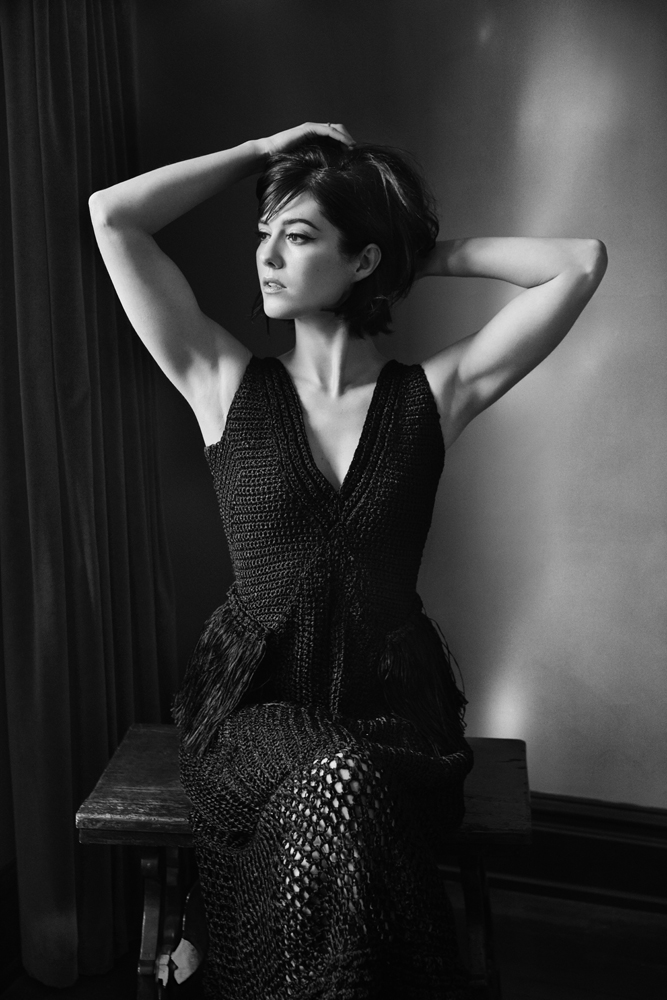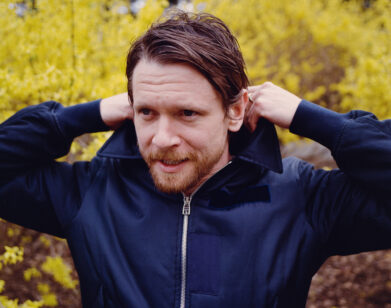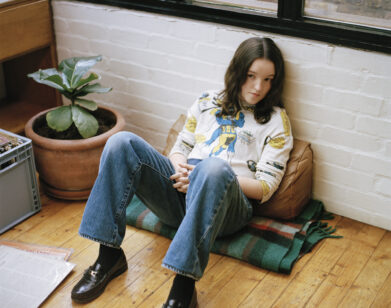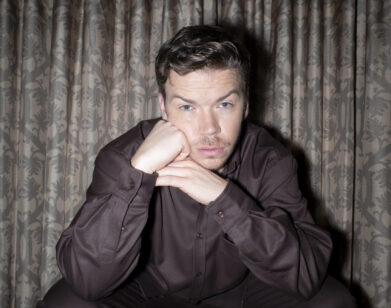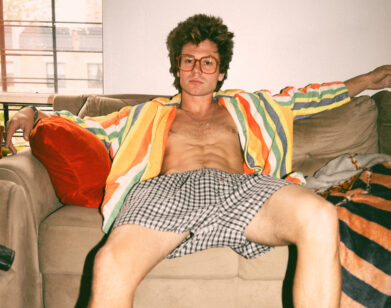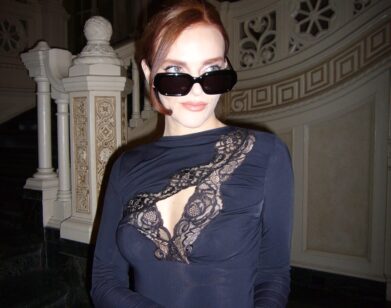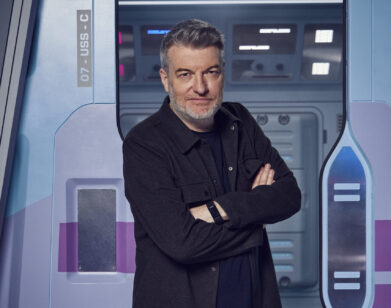Mary Elizabeth Winstead: From Mercy Street to Cloverfield Lane
MARY ELIZABETH WINSTEAD AT THE GRAMERCY PARK HOTEL IN NEW YORK CITY, MARCH 2016. PHOTOS: DAVID NEEDLEMAN. STYLING: SAVANNAH WHITE. HAIR: CHARLIE TAYLOR/HONEY ARTISTS USING HAIRSTORY. MAKEUP: SUZY GERSTEIN/HONEY ARTISTS USING CHARLOTTE TILBURY. SPECIAL THANKS: PR CONSULTING.
In the 2010 film Scott Pilgrim vs. the World, Mary Elizabeth Winstead plays Ramona Flowers, the alluring Amazon Canada employee whose evil ex-boyfriends (and girlfriend) Scott Pilgrim must defeat. Six years on, Winstead has many more projects to her name—from indie movies like Smashed, The Spectacular Now, A.C.O.D., and Alex of Venice to bigger-budget action films like A Good Day to Die Hard. Scott Pilgrim, however, remains a fan favorite. “The audience for it keeps growing even after all these years, which is so great,” she explains at The Gramercy Park Hotel in New York. “I’m really happy that that continues to follow me.”
Born in North Carolina and raised in Salt Lake City, Utah, Winstead has been acting professionally since she was 12. Her first paid role was a guest spot on Touched By An Angel. “I specifically remember being terrible,” she says with a laugh. “Not even good on a child actor’s scale.” As the youngest of five children, Winstead grew up watching classic musicals like West Side Story and Gypsy and ’80s films such as Working Girl. “Sigourney Weaver was big in my house,” she recalls. “There’s just such an energy and personality to those films and those roles. That’s what I want to do.”
This year things are shifting for the 31-year-old actress. In January, Winstead traveled to Sundance to promote two new films: the infamous “farting corpse” movie Swiss Army Man (A24) with Daniel Radcliffe and Paul Dano, and the dramedy The Hollars (Sony Pictures Classics) with Anna Kendrick and John Krasinski. Last month, her six-part miniseries Mercy Street concluded on PBS. Set during the Civil War, Mercy Street follows widowed New England nurse Mary Phinney (Winstead) as she treats both Union and Conferdate soldiers at a hotel-turned-hospital in Alexandria, Virginia. A second season has just been confirmed. Today, 10 Cloverfield Lane, the ultra-secretive J.J. Abrams-produced thriller in which Winstead plays one of three principal characters, opens across the U.S. If all that wasn’t enough, Winstead has also just started working on a new CBS show BrainDead.
In addition to acting, Winstead is one half of the musical project Got A Girl with legendary producer Dan the Automator (Gorillaz, Deltron 3030, Handsome Boy Modeling School). In 2014, the duo released their first album, I Love You But I Must Drive Off This Cliff Now.
EMMA BROWN: I know that you’ve been working consistently since you were a teenager, but it seems like you’re particularly busy at the moment.
MARY ELIZABETH WINSTEAD: It’s kicked up the past couple of years. I think my drive to work has gone up a bit since I’ve gotten older. The more I work the happier I am. I’m also finding a lot more roles that are exciting and challenging for me on a more regular basis.
BROWN: Was there a project in particular that felt like a turning point?
WINSTEAD: I think this independent film I did called Smashed with James Ponsoldt, who is the loveliest, most talented director who really gave me a chance to spread my wings a little bit. Even though that was a small movie, I think that when people saw it they were able to see more of a range of what I can do. From that I’ve done a lot of different types of things—TV or genre films or whatever it may be, but a lot of those parts come back to Smashed because somebody saw that I did good job. I’m thankful to that film.
BROWN: I think of you very much as an indie actress because of Sundance films like Smashed and The Spectacular Now and Swiss Army Man, but you’ve done a lot of bigger budget projects as well.
WINSTEAD: My first movie was a movie that had a bunch of people dying in it—the typical popcorn movie. That’s where I got my start. I found my way into the indie world a bit late in my career, but it was something that I was really passionate about doing.
BROWN: Were people in the indie world critical of the fact that you’d done big budget films in the past?
WINSTEAD: No. I was worried about that when I first found myself in that environment. I was kind of embarrassed by some of the films I had done. I was like, “Oh, they’re going to think I don’t have street cred.” But the reality is a lot of them want to be doing bigger things. They’re finding their voice in this independent community but they’re looking for studios and people to give them a voice on a bigger scale. There are obviously people who want to be very niche, but I think for the most part everybody is trying to reach a larger audience. They were like, “What was it like working on a big film? What was it like working with a studio?” It was different than what I was expecting.
BROWN: Is anyone else in your family in the arts? I know your sister is a neurologist.
WINSTEAD: My oldest sister is a neurologist. My brother is an electrical engineering professor. I have a sister who was huge into arts in school and majored in graphic design and then I have another sister who is a dancer and dance teacher. That’s the closest. We grew up dancing together. I wanted to become a ballerina when I was a kid, so she and I were always at ballet conservatories and going to school with our hair in buns. I’m the only one who got into acting—I don’t really know why that happened.
BROWN: I read that you were too tall to be a ballerina.
WINSTEAD: It’s surprising to a lot of people because ballerinas look so long, but it’s more of a proportion thing. Their legs are long in proportion to their body but in reality they’re very tiny. I actually came to New York when I was 12 and did ballet school for a little while. I was being groomed to be professional, and a lot of the professors and teachers there were drawn to me and thought that I could become a professional ballerina. Then, literally the next year, I went and auditioned for them again and they were so disappointed with how my body had changed and grown. Just having that experience, I very quickly went, “I don’t know if I want to continue this. I don’t really want to continue to put myself in [these] situations…” You’re literally sized up with measuring tape as a 13- or 14-year-old girl. I wanted to opt out of that experience.
BROWN: But in acting you’re sized up by your appearance as well.
WINSTEAD: I guess I didn’t really feel that with acting. It was something that I didn’t really come to experience until much later. I had to go through that a little bit, but I always felt that my talent would trump everything. In ballet, I felt that no matter how good I was, if I didn’t have the right body type or if I didn’t fit a certain mold there was nothing I could do.
BROWN: Do you remember the first time you got positive feedback as an actor?
WINSTEAD: When I was 10, my school did Romeo and Juliet. I was Juliet, and that was, like, the biggest deal ever. I was completely obsessed with the role. I watched the Olivia Hussey [Franco Zeffirelli] film everyday. [laughs] It was my life, playing Juliet. From that moment on I was convinced I was going to be an actress. That was all I really wanted to do. I would continue to dance and after that and sing—I was always a performing arts kid in general—but I felt like my ultimate goal was to be an actress and be in films. I grew up in a big movie house, we watched movies all the time, so I had an awareness at a very young age that that was a job that you could have. I realized that the people weren’t just characters but they were people and they were getting to do something that was so fun and I wanted to be a part of it.
BROWN: You posted a picture from when you ran for student president as a child on your Instagram. Did you win?
WINSTEAD: Oh, I think I did. I really ran a strong campaign; I really went for it. [laughs] I was that overachieving, annoying kid who was always trying to win some contest or win the role. I look back on it now and I’m like, “Chill, man.” [laughs] Calm down.
BROWN: When I first looked you up on the internet, there were a lot of things about roles you almost got…
WINSTEAD: I know. It’s crazy how those things get out. Some of them are true and some of them are completely not true and some of them are half true. Some of those things come out and you don’t know where they came from—somebody’s leaking totally false information. They follow you for years and you have to be like, “I don’t know anything about that.”
BROWN: Have you ever found out that you were considered for a role via internet rumors and it turned out to be true?
WINSTEAD: There’s actually a time when I got cast in something and it was announced that someone else was cast. I hadn’t been told yet if I had the role and I had a breakdown because I really wanted it and it was announced on this website that this other girl had gotten it. I was so sad and called my agents and said, “You guys didn’t tell me this other person got the role!” They were like, “No, they haven’t decided yet.” Then two hours later I got the call that said I had the role.
BROWN: How did you get involved in 10 Cloverfield Lane?
WINSTEAD: It was an odd thing. The first conversation, it wasn’t a full-out offer but it was sort of, “They’re really interested in you for this part in this top secret J.J. Abrams-produced movie. They want you to read the script and see what you think before they officially offer it to you.” So it already came to me shrouded in secrecy and was already very hush-hush.
BROWN: But they let you read the actual script?
WINSTEAD: They let me read the script, but they didn’t let my agents read it or anyone around me read it. It was sent to me as a file that would destruct after you read it once. I was really taken in by the character, [but] before I gave any official word, I wanted to talk to the director, Dan Trachtenberg, who was lovely. I eventually talked to J.J. as well and by the time I talked to everybody I was so on board and that’s when they offered it to me.
BROWN: When get a script, would you normally have your agent read it? Or would you talk to your family or friends?
WINSTEAD: Normally it’s just the agent and we have the conversation. Sometimes I open it up if I want a bit more of an opinion—sometimes my husband will read it, my mom will read it, my sister will read it. But usually it’s after the fact. Once I’ve accepted a role, I’ll let my parents and my sisters read it because they find it entertaining. If you let too many cooks in the kitchen it could cloud your vision of what you want to do.
BROWN: Was anyone else involved when you signed on?
WINSTEAD: John Goodman was cast already, which was a huge plus for me because he’s been such a huge part of my upbringing—he’s so iconic and so talented. So to act opposite of him was something that I wanted to do for a long time.
BROWN: I saw the Super Bowl commercial for the film and was like “Oh, John Goodman plays her dad and he’s trying to protect her.” But that is not at all the case…
WINSTEAD: I love that they don’t give much away [in the trailer,] they just leave you feeling: “What is this? I want to know what is going on.” It’s so different from typical marketing. Normally you see a trailer and go: “Oh, okay I know exactly what that is: this is what happens, this is how it starts, this is where it ends.” The way they have marketed this film just keeps things so open-ended. I love seeing movies blind. I feel like this movie is less about trying to keep secrets from everybody and more about trying to keep that experience pure of going to the movie and not knowing everything that’s going to happen and actually experiencing it when you’re in the theater.
BROWN: But occasionally it backfires and you end up watching a movie about cannibals.
WINSTEAD: Wait, have you seen this movie? No, I’m joking. [laughs]
BROWN: When you agreed to do the film, what were you told to say to other people?
WINSTEAD: There was nothing explicitly laid out, it was more of a feeling that was given—the fact that the scripts were handed out in a very secretive way. If there was a revision it was usually handed to us on set and not passed out to everybody—very on a need-to-know basis. So it was more that you could tell by the way things were being handled that this wasn’t something we were going to talk about in a very open way. Also the very nature of the film, there are so many mysterious elements to it, you know when you read the script, “I want to keep this a secret purely for the sake of the audience and their experience and the entertainment factor of the movie.”
BROWN: I wanted to talk about your music. How did you meet Dan the Automator?
WINSTEAD: He actually did some work on the film Scott Pilgrim vs. the World. He did a couple of songs so he came to set once or twice. I was a big fan of his, so when he came to set I would just go up to him. Then we met again at the film’s premiere and he had been talking to Kid Koala about me, and I guess Kid Koala showed him the video of me singing and told him, “You should check this out.” So he came up to me at the premiere and said, “I heard you sing and I think you’re really good. Maybe we should try and write something together.” We started this slow, several year-spanning collaboration where he would write stuff and send it to me and I would write the melody and the lyrics and send it back to him and he would tell me if it was good or not. We would go back and forth that way and I would fly up to see him every once in a while to record vocals and slowly piece things together.
BROWN: Would you have done a musical project had he not reached out to you?
WINSTEAD: I don’t know if I would have pursued it necessarily. If a musical film had come along, I would have loved the chance to sing in it, [but] I wasn’t sure I could write so I had a lot of fear in terms of making music. [Dan the Automator] forced me to try and write and I discovered that I actually could. Now I can hopefully branch out and write stuff for myself. Before I had no aspirations to be a songwriter because I didn’t know that I had the ability.
BROWN: Was he very honest in his feedback?
WINSTEAD: He’s very honest and very straightforward. The first song we did I think he really liked, which is why it jumped into more songs. But as we started really working together he would be very blunt. I would write a line and he would be like, “No, that’s terrible.” [laughs] Then I would write another line and he’d be like, “Yeah that’s good.” He wouldn’t feed me things to say, he’d just say, “That’s not good, try again.” Even with melodies, we would sit in the recording studio and he would play a track and I would just start singing melodies and sing and sing and sing until he’d say, “Yeah that’s it. You got it now.” It was this very freeform thing.
BROWN: You also have a new show BrainDead. When you join a TV show is the first thing you do the table read?
WINSTEAD: It depends. In this case, the first thing I did was the fitting, which was incredible. I’ve never worn incredible clothes—I’m not used to playing someone so put together and fashionable. But Dan Lawson, who’s the costume designer, has such an incredible eye. I’m fully embracing the fashion aspect of the character. So that was the start, which is great because it really helps you to get inside the mind of the character once you start wearing the clothes and understanding what this person is going to look like. It’s a nice window.
10 CLOVERFIELD LANE COMES OUT TODAY, MARCH 9.

